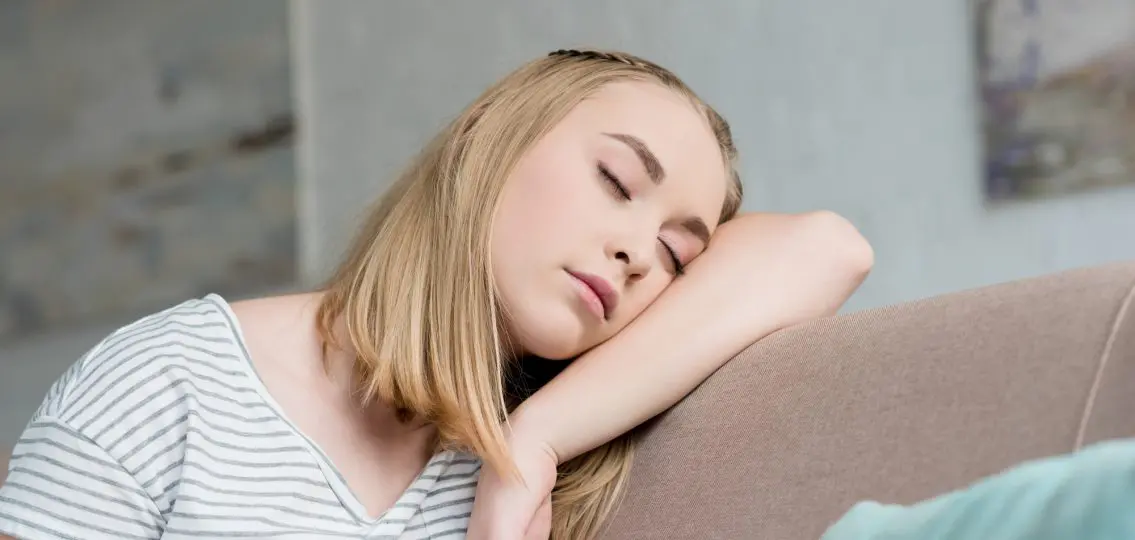If you find yourself shouting “Go to bed” at your teenager most nights, then this issue’s interview with Dr. Carolyn E. levers-Landis is for you. Your Teen caught up with levers-Landis to learn what teenagers really need when it comes to sleep. Her answers may surprise (and delight) you.
Q: Teenagers go to bed later and get up later. Why?
Ievers-Landis: Teenagers have a different circadian rhythm, or sleep/wake cycle, than younger children and most adults. For the majority of teenagers, the natural sleep cycle is falling asleep around midnight to 1 a.m. and waking up around 8 to 9 a.m. So, during the school week, most teenagers are short on sleep because they wake up three hours earlier than their natural sleep/wake cycle. And then they sleep late on the weekend to compensate. Your teenager is not lazy or unmotivated if she wants to sleep until noon on a Saturday. She’s responding to the natural and normal biological cues of her body.
Q: What’s a healthy amount of sleep for teenagers?
Ievers-Landis: The recommendations are eight to nine hours, but everyone is different, and there is a wide range of how much sleep teenagers need to function optimally. Some might need seven hours; others might need ten hours.
Q: How can I figure out how much sleep my teenager needs?

Q: Should parents intervene if their teenager stays up too late on a device?
Ievers-Landis: I recommend parents approach this democratically. Say to your teenager, “I understand you want to keep in touch with your friends. I understand that your homework takes up a lot of your evening. How much downtime do you need after homework to use your electronics?” However, at some reasonable time, the electronics need to be put away. If your teenager can abide by this deadline on his own, electronics may be kept in the bedroom. Otherwise, he should be expected to store these devices elsewhere. Most adolescents want to do well in school, so there may be nights when they will be up late doing homework. That’s okay if it’s not a daily issue. If they have multiple tests or homework in many classes, don’t compound their stress by yelling at them for staying up too late.
Q: How can parents recognize when their teenager needs more sleep?
Ievers-Landis: Gauge their functioning overall. Is she getting good grades? Is your teenager getting along fairly well with people? Does she have friends? Is she able to cope with stress fairly well? Ask your teenager whether she has to struggle to stay awake during the day.
Q: How can we make it easier for our teenagers to fall asleep?
Ievers-Landis: After dinner, the pineal gland in our brains starts producing the hormone melatonin, which relates to our sleep/wake cycle and helps us fall asleep. The melatonin builds up as the evening progresses until we have enough in our brain to assist with the process of falling asleep. Our bodies continue to produce melatonin until approximately halfway through the night, and then the levels of melatonin start to dissipate and clear by the morning.
Because light can inhibit the production of melatonin, dimming lights and shutting off screens before bedtime can help. Other behaviors that assist in the maintenance of a regular sleep/wake cycle include getting light exposure in the morning, going outside and getting exposure to sunlight during the day, eating regular meals and snacks, being physically active, and avoiding late-afternoon naps. Another tip—teenagers should use their beds only for sleep. Doing homework or hanging out in bed can confuse our brains about the main purpose for our beds, which is to sleep.
Q: Do you recommend taking melatonin?
Ievers-Landis: I would recommend that parents of adolescents consult with a behavioral sleep medicine specialist, e.g., a physician or a psychologist, before allowing their child to take melatonin. Adolescents could actually make their sleep worse using melatonin if it is not used correctly. Melatonin is not a magic bullet. You can’t just give it to a child, and he will fall asleep. It works with the body’s natural circadian rhythm, so the timing and the dosage are vitally important. Even though it’s a supplement, it can still have side effects.
Q: And other sleep aids?
Ievers-Landis: Never. In fact, we rarely recommend medication for children and adolescents. Many sleep disorders can now be treated with behavioral treatments such as cognitive-behavioral therapy for insomnia (CBT-I). Also, we never recommend Benadryl, which may actually have the opposite effect and cause excitation, or medications like Tylenol P.M. that may cause liver damage.
Q: How can we recognize whether our teenager has a sleep disorder?
Ievers-Landis: If a sleep issue is significantly impacting your child’s quality of life, go see someone. Even if they don’t meet all the criteria for a disorder, there’s still a lot that can be done to help.
Q: Insomnia. How is that treated these days?
Ievers-Landis: There are so many effective behavioral treatments for insomnia, and the main components are sleep hygiene, relaxation training, stimulus control (e.g., using the bed for sleep rather than wake behaviors), sleep restriction and sleep regulation (i.e., minimizing the difference between weekday and weekend wake-up times). A trained behavioral sleep medicine specialist can assist your adolescent to improve his sleep using these techniques customized to your adolescent’s particular situation. For example, if your teenager is lying in bed for hours and having difficulty falling asleep, one of the initial steps of treatment would be to instruct the teenager to go to bed later. Another focus of treatment might be relaxation training for teenagers who can’t fall asleep because of worry or anxiety.
Q: Parting thoughts?
Ievers-Landis: Lately, I’ve seen many parents who get upset when their teenagers go to bed late and wake up late. I encourage parents to be supportive and encouraging, and speak with their child about sleep behaviors and what may be interfering with getting adequate sleep. Remember, one of the primary reasons your teenager stays up late and sleeps in is because of her natural circadian rhythm. The school routine leads to a sleep deficit, so expect that on the weekend, your teenager will probably need at least some make-up sleep. This does not reflect laziness or lack of motivation. For a teenager, it’s simply normal.





